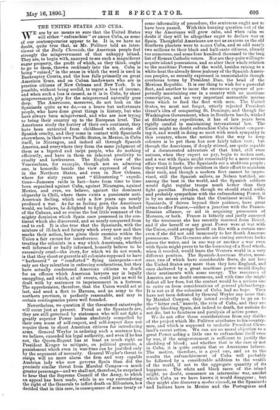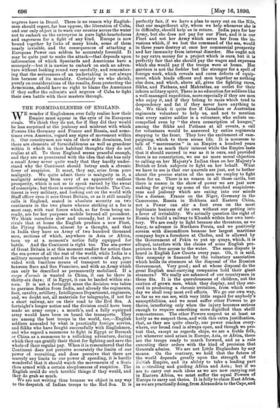THE UNITED STATES AND CUBA.
WE are by no means so sure that the United States will either "enfranchise" or annex Cuba, as some of our contemporaries appear to be. It is, we have no doubt, quite true that, as Mr. Pulitzer told an inter- viewer of the Daily Chronicle, the American people feel strongly the misgovernment of that unhappy island. They are, to begin with, annoyed to see such a magnificent sugar property, the profit of which, as they think, ought to go to them, thrown recklessly into the sea. Cuba is being " ruined," in the sense in which the word is used in Bankruptcy Courts, and the loss falls primarily on great American firms, and on Cuban landowners who are in practice citizens of New .Orleans and New York. It is possible, without being sordid, to regret a loss of income, and when such a loss is caused, as it is in Cuba, by sheer misgovernment, pity for the misgoverned naturally goes deep. The Americans, moreover, do not look on the Spaniards quite as we do,—as a brave but unfortunate people, who have done great things in history, but who have always been misgoverned, and who are now trying to bring their country up to the European level. The Americans study the history of their own continent, they have been saturated from childhood with stories of Spanish cruelty, and they come in contact with Spaniards everywhere, in their own Pacific States, in Mexico, in Cuba itself, in Nicaragua, and indeed all through Spanish America, and everywhere they form the same judgment of them as a bigoted and inept people, who do nothing efficiently, and have in them an inherent proclivity to cruelty and lawlessness. The English view of the Venezuelans, for example, though not an admiring one, is honorific beside the view expressed of them in the Northern States, and even in New Orleans, where for sixty years past " filibustering " expedi- tions—Jameson raids in fact—have from time to time been organised against Cuba, against Nicaragua, against Mexico, and even, we believe, against the dominant oligarchy in Chili, where there exists a passionate anti- American feeling, which only a few years ago nearly produced a war. As far as feeling goes, the Americans would, we believe, be delighted to fight Spain on behalf of the Cubans, and so rescue the last little remnant of the mighty dominion which Spain once possessed in the con- tinent which she discovered, and so nearly conquered from end to end. It is also true that the Spaniards, with the mixture of ill-luck and fatuity which every now and then marks their action, have given their enemies within the Union a fair excuse for interference. Not only are they treating the colonists in a way which Americans, whether well informed or badly informed, honestly believe to be excessively cruel—the story, for which we do not vouch, is that they shoot or garrotte all colonists supposed to have " harboured. " or " comforted " flying insurgents—not only are they relentless in enforcing confiscations, but they have actually condemned American citizens to death for an offence which American lawyers say is legally smuggling, and which, at all events, could just as well be dealt with by sentences to imprisonment in a fortress. The apprehension, therefore, that the Union would act at last, and send a fleet to Havana, and an army to the northern province, is perfectly reasonable, and may in certain contingencies prove well founded.
Nevertheless, we question if the threatened catastrophe will occur just at present. Proud as the Spaniards are, they are still governed by statesmen who will not fight a greatly superior Power unless absolutely compelled by their own sense of self-respect, and self-respect does not require them to shoot American citizens for introducing arms. General Weyler in ordering such a sentence has, we believe, exceeded his legal authority, and even if he has not, the Queen-Regent has at least as much right as President Kruger to mitigate, on political grounds, a. punishment which even in war-time can be justified only by the argument of necessity. General Weyler's threat to resign will no more alarm the firm and very capable Austrian lady who now governs Spain than did the precisely similar threat from Marshal Campos—a much greater personage—and we shall not, therefore, be surprised to hear that the Supreme Council of the Army, to which an appeal has been made, while in no way surrendering the right of the Generals to inflict death on filibusters, ha s decided that in this case, in consequence of some treaty or some informality of procedure, the sentences ought not to have been passed. With this burning question out of the way the Americans will grow calm, and when calm we doubt if they will be altogether eager to declare war on Spain. Thoughtful Americans are not as anxious as the old Southern planters were to annex Cuba, and so add nearly two millions to their black and half-caste citizens, already too numerous, and some four hundred thousand to the long list of Roman Catholic voters. Nor are they quite willing to acquire island possessions, and so alter their whole relation to the maritime Powers of the world, besides raising to a white-heat the already fierce jealousy of the Spanish-Ameri- can peoples, so recently expressed in unmistakable though courteous terms by President Diaz, the head of the Mexican Republic. It is one thing to wish for a powerful fleet, and another to incur the enormous expense of per- petually maintaining one in a country with no maritime conscription, and no very important mercantile marine from which to feed the fleet with men. The United States, we must not forget, utterly rejected President Grant's idea of conquering St. Domingo, and though the Washington Government, when in Southern hands, winked at filibustering expeditions, it has of late years been rigidly careful in maintaining international law. The Union might no doubt enfranchise Cuba without conquer- ing it, and would in doing so meet with much sympathy in this country, where the notion that the way to keep colonies is to pet them has now fairly taken root ; but though the Americans, if deeply stirred, are quite capable of a disinterested adventure of that kind, still even nations, when they expect no pay, begin to reckon cost., and a war with Spain might conceivably be a more serious affair than it looks. The Spaniards are a stubborn people ; they would forget their creditors in their effort to maintain their rank, and though a modern fleet cannot be impro- vised, still the Spanish sailors, as Nelson testified, are among the best in the world, and the Spanish soldiers would fight regular troops much better than they fight guerillas. Besides, though we should stand aside, and probably sympathise with the enfranchising Power, it is by no means certain that the Continent would. The Spaniards, if driven beyond their patience, have great terms to offer France,—either a junction with the Franco- Russian alliance, or aid in acquiring possession of Morocco, or both. France is bitterly and justly annoyed by the treatment she has recently received from Brazil. and if she herself or any great Power were at war with the Union, could avenge herself on Rio with a certain ease even if she did not add immensely to her South Amerean possessions. The Germans also are casting covetous looks across the water, and in one way or another a war even with Spain might prove to be the loosening of a, flood which, when it receded, would leave the Western world in a very different position. The Spanish-American States, more- over, two of which have considerable fleets, do not love the United. States any more than they love England, and once sheltered by a great maritime power would display their sentiments with some energy. The resources of America are no doubt enormous, and with time she might defeat all her foes, but the contest would be a serious one to enter on from considerations of general philanthropy. It is not as if the colonists of Cuba had no hope. They have not been defeated by General Weyler any more than by Marshal Campos, they intend evidently to go on to the " bitter end," namely, the ruin of Cuba, and they are slowly bleeding Spain, not indeed to death, for nations do not die, but to faintness and paralysis of active power.
We do not offer these considerations from any dislike of the project which Mr. Pulitzer attributes to his country- men, and which is supposed to underlie President Cleve- land's recent action. We can see no moral objection to FL great Power aiding a little one to enfranchise itself even by war, if the misgovernment is sufficient to justify the shedding of blood ; and whether that is the case or not in Cuba, it is quite certain that so Americans believe. The motive, therefore, is a good one, and as to the results the enfranchisement of Cuba will probably be followed by a considerable addition to the wealth of the world, if not to the aggregate quantity of its happiness. The white and black races of the island might, no doubt, commence an internecine war, amidst which Cuba as we have known it would disappear ; but they might also discover a moduli vivendi, as the Spaniards and Indians have in Mexico and the Portuguese and negroes have in Brazil. There is no reason why English- men should regret, far less oppose, the liberation of Cuba, and our only object is to warn our cousins across the water not to embark on the enterprise in pure light-heartedness and eagerness for a fight of any kind. Europe is now bound together by links of many kinds, some of them nearly invisible, and the consequences of attacking a European Power can seldom be accurately foretold. It may be quite just to make the attack—that depends upon information of which Spaniards and Americans have a monopoly—but it is unwise to embark on such an adven- ture without looking round very carefully, and remember- ing that the seriousness of an undertaking is not always less because of its morality. Certainly we who shrink, purely on considerations of the results, from protecting the Armenians, should have no right to blame the Americans if they suffer the colonists and negroes of Cuba to fight their own battle with their masters through.







































 Previous page
Previous page